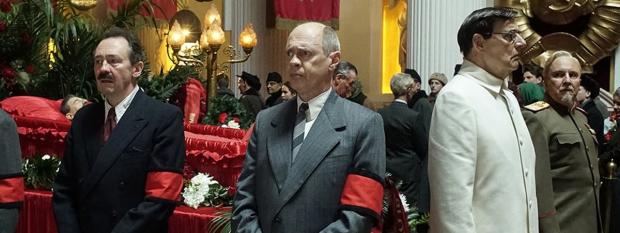The Death of Stalin
At the height of his career in 1960, while doing location shoots for The Apartment, Billy Wilder was thinking about the precarious state of world politics and wondering how he might address them from his particular comic perspective. He came up with the idea of letting the Marx Brothers loose in the United Nations building. The brothers liked the idea, but Harpo had a heart attack, Chico died, and the movie was never made. Wilder found another outlet for his political satire, Coca Cola capitalism, in the brilliant farce One, Two, Three.
Had that Marx-Wilder collaboration been made, it would have looked a lot like The Death of Stalin, the new film by Armando Iannucci. He’s best known in the US for his HBO series Veep, but Great Britain has enjoyed three decades of brilliant comedy from the Scottish writer-director. (Yes, Scottish. His father was an Italian émigré—the US isn’t the world’s only melting pot.) If you have a subscription to Hulu, watch The Thick of It, his BBC series that was the inspiration for Veep (and the spinoff film In the Loop): It is hands down the funniest political satire I have ever seen.
Adapted from a French graphic novel, The Death of Stalin is set in 1953 in the months after the title event, as the top leaders in the Communist leader’s government struggle for power. These are played by as top-flight an ensemble as you’re likely to find in a movie this year. Steve Buscemi, with a shaved head and padding that make him resemble Homer Simpson, plays Nikita Khrushchev, head of the Communist party. Though we all know that he became the next premier, in 1953 he was seen as a mere politician, unlikely to rise to power: He’s more concerned with cementing his stature through jokes and backslapping. The likely heir is Georgy Malenkov, Stalin’s deputy, played by Jeffrey Tambour as a spineless popinjay in ridiculous suits. The schemer is Lavrentiy Beria (UK stage star Simon Russell Beale), spymaster with as much blood on his hands as his boss, who hopes to manipulate Malenkov to his own ends. Michael Palin is diplomat Vyacheslav Molotov, a true believer in Stalinism even though he had just been named to Stalin’s enemies list before his death.
Less directly involved but the source of some of the film’s funniest scenes are Field Marshal Georgy Zhukov (Jason Isaacs), who as head of the army and a hero credited with defeating the Nazis may be the only person within shouting distance of the Kremlin with a secure position, and Stalin’s alcoholic son Vasily (Rupert Friend), a threat to no one but himself.
Iannucci specializes in the comedy of discomfort, a style he makes work because he doesn’t feel the need to make any of his characters likeable. As plans unfold and collapse, the humor comes from the fact that all of these schemers are terrified of everyone around them, with good reason. (Stalin housed all of his ministers in luxury apartments close to the Kremlin, the better to maintain control over them: By the time we’re introduced to them, these rats have spent years living in close quarters with others who would have had no compunction about stabbing them in the back if it served their purposes.)
This may sound like thick going, and there’s no question that the more you know about the milieu going into it the more you’ll get out of it. Iannucci and his co-writers don’t linger on the horrors of the era, largely because they assume viewers will be at least generally familiar with them but also because there’s only so much they can put into a 100-minute movie. But in the end you wish that this had been made as a series for television: So much more could have been done with the material and the characters with more space.
Still, even if the motivations and events aren’t always clear, the performances are often hilarious. No one in the cast bothers with a fake Russian accent, nor does the dialogue attempt to mimic an earlier time. If parts of the film feel, as some critics have complained, like a bunch of unchecked teenage boys squabbling, it’s hard to argue that that’s not an apt depiction of politics through the ages.

